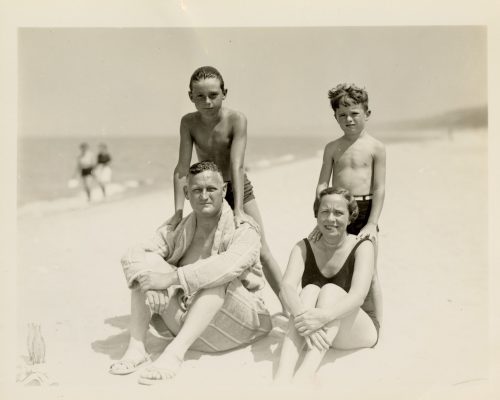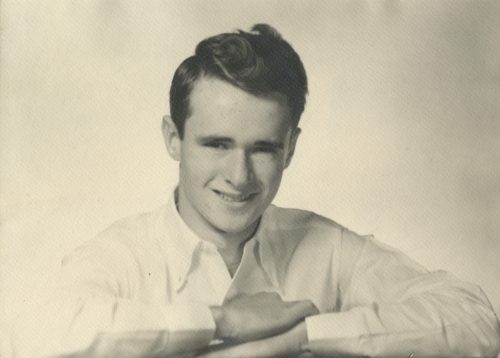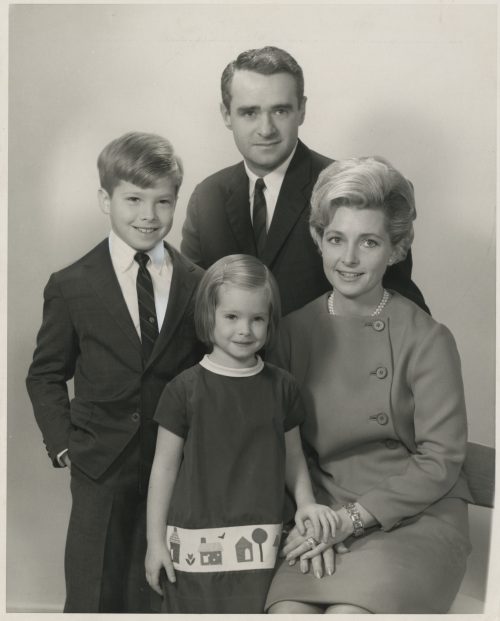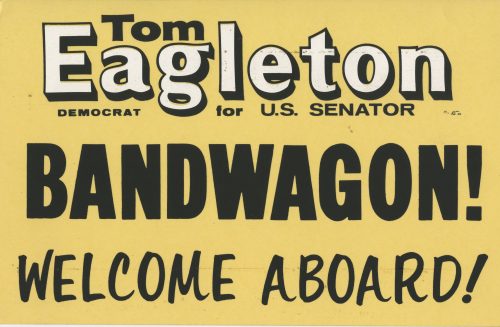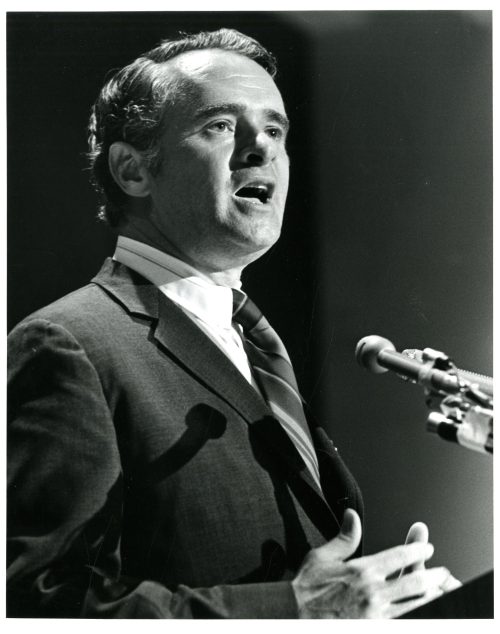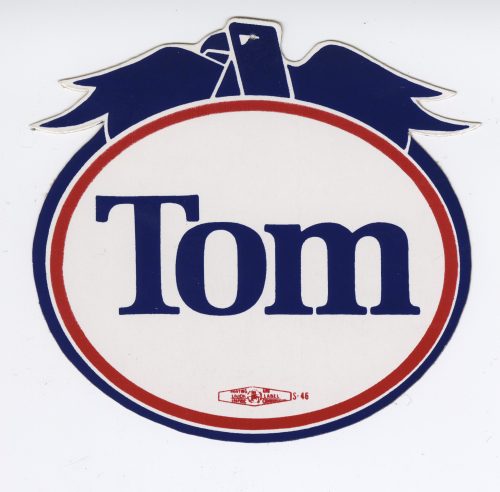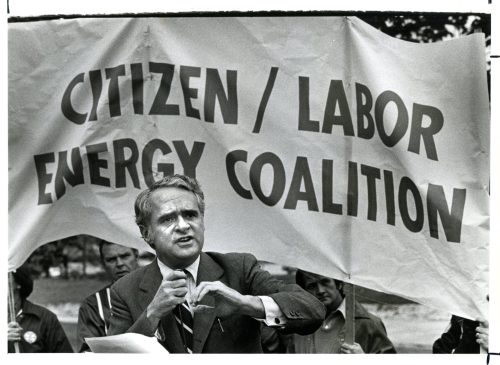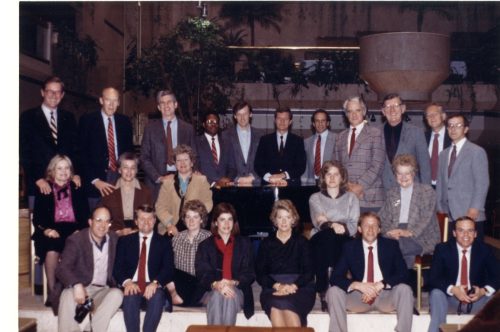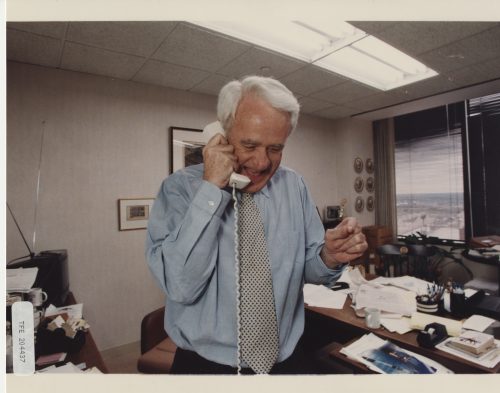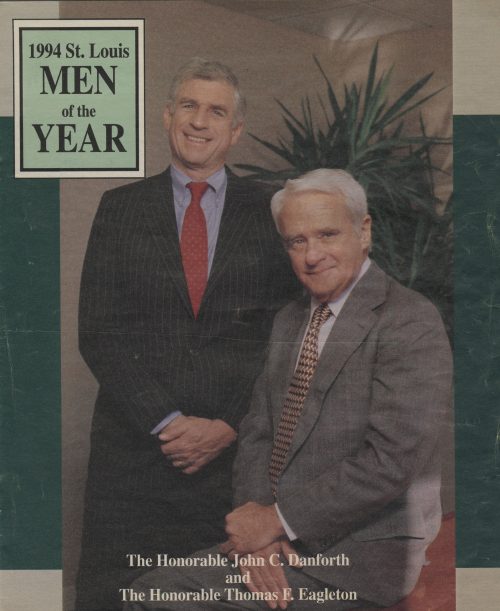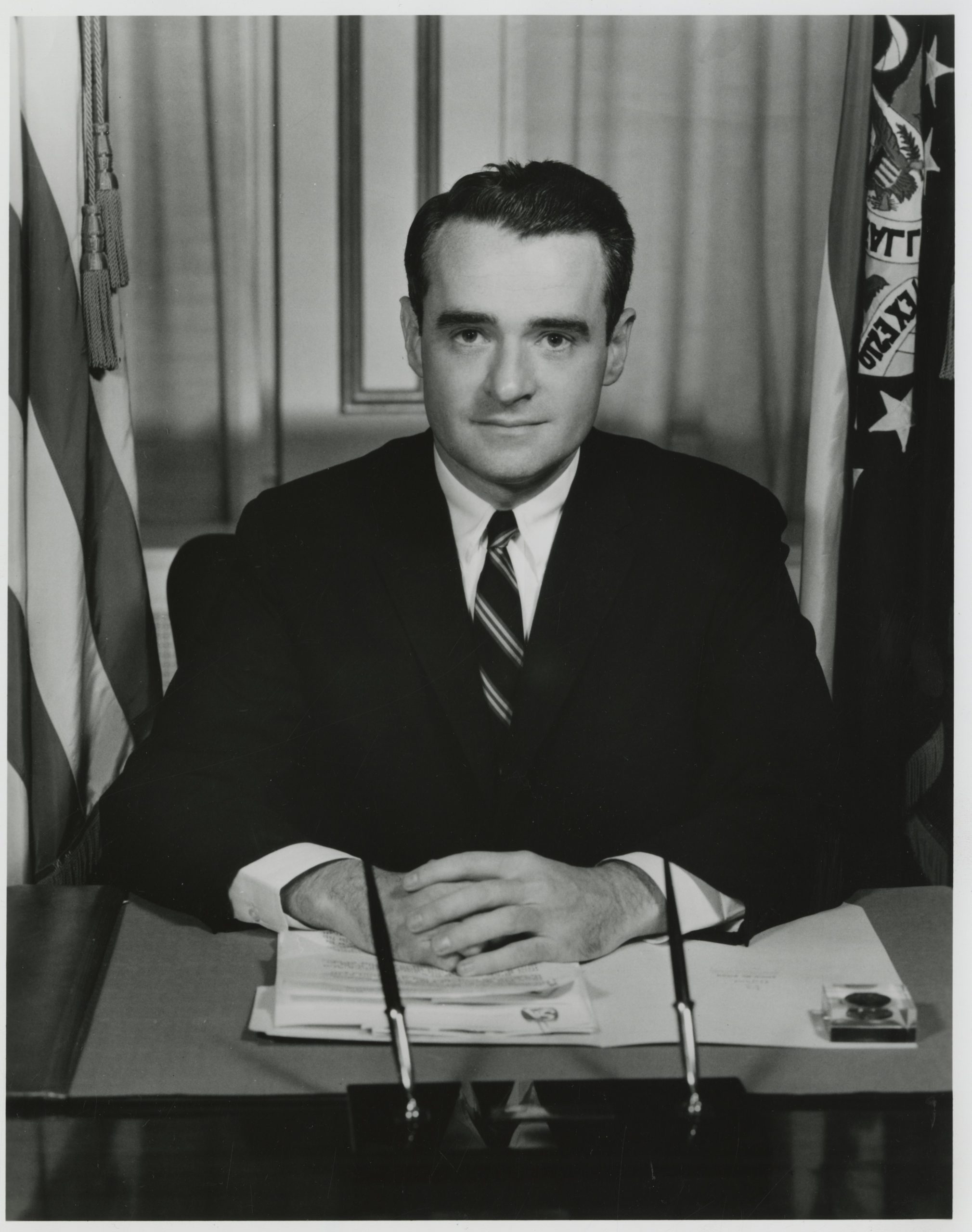
Thomas F. Eagleton
Introduction
Thomas F. Eagleton was a politician from St. Louis, Missouri, who served three terms in the US Senate from 1968 to 1987. In 1972 he became the center of public attention when George McGovern, the Democratic candidate for president, removed him from the party ticket. Eagleton was dropped as the candidate for vice president after just eighteen days when the public learned that he had been treated for depression years earlier and had received electrical shock therapy as part of his treatment. Mental illness was poorly understood at the time, and fears about it forced Eagleton to withdraw from the race, but he came to be considered a folk hero after the incident. Missouri voters reelected him to the Senate two more times after 1972. After his career in Washington, Eagleton returned to St. Louis and was essential in bringing professional football back to the city. He helped bring the Los Angeles Rams to St. Louis in the 1990s.
Early Years
Thomas Francis Eagleton was born September 4, 1929, in St. Louis, the second of two sons of Mark D. Eagleton and Zitta Louise Swanson. Though he liked to call himself his mother’s favorite child, he said that he went into politics because of his father’s influence. The young Eagleton remembered his father taking him to the 1940 Republican National Convention. His father also made sure that Tom was in the room to listen and learn when local St. Louis politicians visited the Eagleton home. These visits exposed him to different views, cultures, and beliefs.
Education
Eagleton attended Country Day School in St. Louis as a child, then followed his older brother Mark Jr. to Amherst College in Massachusetts. He stayed in college for only a year and a half before dropping out to join the US Navy. At this time, Eagleton’s mother passed away, and her death greatly affected him. He would revere her for the rest of his life, referring to her as a “Saint.” After serving in the Navy, Eagleton returned to Amherst, graduating in 1950. He then earned a law degree at Harvard Law School in 1953.
Missouri's Eagleton
After law school, Eagleton came home to St. Louis to work in his father’s law office. In 1956 he married Barbara Ann Smith of St. Louis. Their son Terrance was born in 1959, and a daughter, Christina, followed in 1963. With his family life coming together, Eagleton began pursuing a political career. He was elected circuit attorney of St. Louis in 1956, and in 1960 he won a statewide office, becoming Missouri’s youngest attorney general at the age of thirty-one. In 1964 he was elected Missouri’s lieutenant governor. He held that office until he ran for the US Senate for the first time in 1968.
Eagleton hoped to unseat Edward V. Long, who had been in the Senate since 1960 and was expected to win the Democratic primary. But Eagleton came out on top and advanced to the general election against Republican nominee Thomas B. Curtis. By 1968, Americans had become very divided over Vietnam, and Eagleton often clashed with Curtis about how the United States was involved in the war there. Eagleton defeated Curtis in a close election and joined the Senate on December 28, 1968.
War & Presidential Powers
In Washington, the newly elected senator was expected to work on the most pressing issues of the day. In 1968 the Vietnam War, which the United States had been engaged in since the 1950s, was the most difficult foreign policy issue of the time. Eagleton tried to keep the promises he had made during his campaign that he would stop the United States from becoming any more deeply involved.
President Richard Nixon, a Republican who, like Eagleton, had just been elected, had promised to end the war in Vietnam. But Nixon’s plan to win battles first so that the United States could be in a stronger position before pulling out did little to bring the war’s end closer. The president not only wanted to increase the air war over North Vietnam but also to begin bombing Cambodia, a neighboring country in which the Vietnamese had built supply lines to its soldiers fighting in the south.
Nixon’s war strategy was hotly debated in the Senate, and Eagleton and many of his colleagues believed that something needed to be done to check the president’s powers to make war. Eagleton became a leading sponsor of the War Powers Act, which attempted to limit the president’s powers by requiring approval from Congress for acts of war. This effort halted the bombing of Cambodia and resulted in the War Powers Resolution of 1973. But Eagleton ended up voting against this act because it had been changed so much by the time it passed that he believed it no longer did what he hoped it would do. To Eagleton’s disappointment, Congress passed the changed bill, even over President Nixon’s veto. In response, he wrote a book, War and Presidential Power: A Chronicle of Congressional Surrender, to say that he believed Congress had surrendered its power and failed to carry out its constitutional duties. He saw it as an empty victory that still left the real power to make war with the president.
1972 Vice Presidential Nomination
The 1972 election pitted Nixon against the Democratic challenger George McGovern, a senator from South Dakota. McGovern needed a running mate, but his first several choices turned him down. McGovern finally asked Eagleton, who agreed to run for vice president, but it soon became clear that no one had looked carefully enough into Eagleton’s background.
Eagleton would have the shortest run for vice president in US history. He was on the ticket for exactly eighteen days. He had served four years of a six-year Senate term and was well-liked and respected, but in the late 1950s and early 1960s he had been treated for depression at a psychiatric hospital. Though it had been years since he had needed treatment, public fears that he was not fit for high office led the McGovern camp to see him as too much of a risk to stay on the ticket. McGovern asked him to quit the race. Eagleton stepped down, while famously saying, “George, you weren’t going to win with me, but now you sure aren’t going to win without me.” He was correct: McGovern and his new running mate, Sargent Shriver, lost the 1972 election in a landslide.
Thomas F. Eagleton, "The Statesman"
After the 1972 election disaster, Eagleton went back to work in the Senate representing the people of Missouri. Missourians had overwhelmingly supported him and flooded his office with calls and letters after he resigned as the vice presidential candidate. Their support continued in 1974 when Eagleton won 60 percent of the vote in his reelection bid for senator. He was Missouri’s choice again when he ran for a third term in 1980, but the 1980 election was the most difficult one he faced during his political career. He was running against the “Reagan Revolution,” in which the Republican Party swept Ronald Reagan into the White House and gained a majority in the Senate for the first time since the 1950s.
After a narrow victory over his Republican challenger, Gene McNary, Eagleton decided he would not run for the Senate again when his term ended in January 1987. During his eighteen-year Senate career, Eagleton had built his reputation as a statesman, dedicating his time to the Vietnam War, foreign affairs, protecting the elderly, aiding Missouri farmers, and finding other ways to help his state.
He proved more than willing to reach across the aisle and work with his fellow Missouri senator, Republican Jack Danforth, on efforts such as establishing the Irish Wilderness area in the Missouri Ozarks, fighting the Meramec Dam project, and giving control over the Panama Canal to Panama despite much public opposition to giving back the canal. Eagleton also fought to keep Lambert Airport in St. Louis when an attempt was made to move it across the state line into Illinois. As he neared the end of his last term, Eagleton often jokingly signed his correspondence, “Thomas F. Eagleton, Statesman.”
"The Professor"
After retiring from the Senate, Eagleton returned to St. Louis. He joined the law firm Thompson and Mitchell, where he did some legal work for the Anheuser Busch company. He accepted an appointment at Washington University, where he taught classes in business, government, and recent US history. He also played an important role in civic projects and sat on many boards and commissions, including the board of the Truman Presidential Library across the state in Independence.
When Eagleton joined the Truman Library board in 1991, serious improvements were needed. The library had missed out on federal funding and had made other financial blunders as well. Eagleton began working with Larry Hackman, the library’s new director, to secure better funding and upgrade the museum. Major renovations were done in the mid-1990s during Eagleton’s term on the board.
One of the roles that Eagleton was most proud of in his later years was his role as a university professor. In 1987 he became a professor of Public Affairs at Washington University and continued to teach until 2003. He taught a course in Business and Government with well-known economist Murray Weidenbaum, even writing a textbook for the course. Eagleton taught another course with historian Henry Berger on a familiar subject: the Vietnam War. He was popular with his students, who enjoyed his friendliness and sense of humor. Changing his signature to match his new duties, he now signed letters “Thomas F. Eagleton, The Professor.”
"Mr. Football"
A lifelong sports fanatic who loved the baseball Cardinals and other St. Louis teams, Eagleton joined efforts in the 1990s to bring professional football back to the city. The previous team, the football Cardinals, had left for Arizona in 1987. In 1994, Eagleton became president of FANS Inc., which was created to lure an NFL team to St. Louis. The group soon set its sights on the Los Angeles Rams, who were in dire straits in the early 1990s. Rams owner Georgia Frontiere thought a move out of Los Angeles was the best way to get the team back on track, but the NFL voted down a move to St. Louis before FANS Inc. and Eagleton helped the league change its mind. As part of the deal to move the Rams to St. Louis, the city had to build a new stadium, paid for with taxpayers’ money, which they named the Trans World Dome (now called the Dome at America’s Center).
The Rams’ first season in St. Louis was in 1995. After struggling on the field for several years, the Rams made the playoffs in five out of six seasons that included a Super Bowl win against the Tennessee Titans in the year 2000. The team’s time in St. Louis proved to be short, and the Rams moved back to Los Angeles in 2015. But Eagleton had played a pivotal role in landing the team, and he enjoyed calling himself “Mr. Football.”
Legacy
Thomas Eagleton was given many honors for his service to his beloved state. In 1994, he and his Senate colleague and friend John “Jack” Danforth were named St. Louis Men of the Year. Eagleton’s crowning glory, however, came later. On September 11, 2000, the Thomas F. Eagleton US Courthouse was dedicated in St. Louis at a ceremony attended by his close family, friends, and former colleagues. Twenty-nine stories tall and with nearly a million square feet, the building is the largest federal courthouse in the country and one of the tallest structures in Missouri.
Thomas F. Eagleton passed away on March 4, 2007, at the age of seventy-seven. He was remembered for many reasons, but one that stood out was his witty sense of humor that often brought others closer while poking fun at himself. It seemed the more he liked someone, the more he joked with them, often sending letters full of humor to friends, family, colleagues, and staff members. As Jack Danforth described him, “What has set Eagleton apart is not his intellect and his energy, impressive as they are. It is his moral passion, his capacity for outrage, his insistence that justice be done, that wrongs be made right.” Before his passing, Eagleton himself had a few last words to say: “Go forth in love and peace, be kind to dogs, and vote Democratic.”
Text and research by Hali R. Allen
References and Resources
For more information about Thomas F. Eagleton’s life and career, see the following resources:
Society Resources
The following is a selected list of books, articles, and manuscripts about Thomas F. Eagleton in the research centers of The State Historical Society of Missouri. The Society’s call numbers follow the citations in brackets.
Articles from the Newspaper Collection
- “Eagleton in Demand as Speaker.” St. Louis Post-Dispatch. August 2, 1972. p. 14.
- “Eagleton Joint Author of Proposed War Powers Act.” Columbia Daily Tribune. April 9, 1972. p. 20.
- “Eagleton Manages to Keep Smiling Almost to the End.” The Buffalo News. August 1, 1972. p. 4.
- “Eagleton Outlines War Act.” The Kansas City Star. March 29, 1972. p. 11.
- “McNary’s Talk, Eagleton’s Deeds.” Poplar Bluff Daily American Republic. September 24, 1980. p. 4.
- “Mrs. Truman, Stan Musial to Head Eagleton’s Campaign.” Columbia Daily Tribune. July 7, 1974. p.2.
- “Nixon Carries 30 States to Win: Hearnes, Eagleton and Danforth Winners in Missouri.” Columbia Daily Tribune. November 6, 1968. p. 1.
- “Special Report: The Dedication of the Thomas F. Eagleton U.S Courthouse.” St. Louis Post-Dispatch. September 10, 2000. p.28.
- “Tom Eagleton Proved his Fitness as a Man.” The Sedalia Democrat. August 4, 1972. p.8.
- Eagleton, Thomas F. War and Presidential Powers: A Chronicle of Congressional Surrender. New York: Liveright, 1974. [REF 352.235 Ea38]
- Giglio, James N. Call Me Tom: The Life of Thomas F. Eagleton. Columbia: University of Missouri Press, 2011. [REF F508.1 Ea38]
- Thomas F. Eagleton Papers (C0674)
Papers of circuit attorney for the City of St. Louis, 1956-1960; attorney general of Missouri, 1960-1964; lieutenant governor of Missouri, 1964-1968; and U.S. senator from Missouri, 1969-1986. Includes correspondence, photographs, speeches and press releases, audiovisual materials, microfilm and newspaper clippings. Also includes information from Eagleton’s post-senate career.
Outside Resources
These links will take you outside the Society’s website. The Society is not responsible for the content of the following websites:
- Darling, W. Stuart, and D. Craig Mense. “Rethinking the War Powers Act.” Presidential Studies Quarterly 7, no. 2/3 (1977): 126–36. http://www.jstor.org/stable/27547344.
- Dudziak, Mary L. “The Unhappy Legal History of the War Powers Resolution.” Modern American History 6, no. 2 (2023): 270–73. https://doi.org/10.1017/mah.2023.26.

